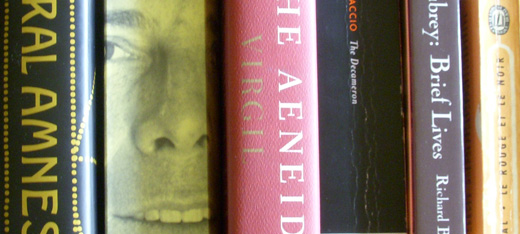
¶ In Moby-Dick, we have “The Street,” another short chapter, makes me wonder about New Bedford and New York, as well as other ports such as Salem. Why wasn’t New York, for one thing, a whaling port? Why didn’t the sailors of New Bedford find something else to exploit after the advent of petroleum?
The chapter ends with one of Melville’s prose poems.
And the women of New Bedford, they bloom like their own red roses. But roses only bloom in summer; whereas the carnation of their cheeks is perennial as sunlightg in the seventh heavens. Elsewhere match that bloom of theirs, ye cannot, save in Salem, where they tell me the young girls breathe such musk, their sailor sweethearts smell them miles off shore, as though they were drawing nigh the odorous Moluccas instead of the Puritanic sands.
¶ Chapter VI of Don Quixote is given over to literary criticism — of a sort. The priest and the barber haul down the books in Don Quixote’s library and consign most, but not all, of them to the flames — or at least to a pile in the corral. I expect that to be a true Cervantes scholar you have to read all these books — if you can find them. I don’t, for example, think that Faber Finds is the the place to go — yet — for a copy of Lenchor Ortega de Ubeda’s Felixmarte of Hyrcania (1556).
¶ In Wilson, an omnium-gatherum, blog-entry of a chapter, “God — And the Americans.” The idea seems to be that the English resisted modernism of any kind — except possibly in fiction. The chapter begins with a very disappointing statement: “Our story occures against the background of Europe’s collective suicide…” Even Wilson knows it’s more interesting than that. He seizes very interestingly on Pius X, “the first holder of that office in modern times not to be educated beyond seminaries, nor to be of noble birth”:
In The Makers of Modern Europe (1930), Count Carlo Sforza remarked upon the peasanty origins of the anti-modernist pope. Whereas “the prejudices of the aristocrat are often counterbalanced by his scepticism, always by his laziness …. those of the peasant have no counterpoise.” Characters such as Pope Pius are “hard on the noblest minds whose doubts and misgivings they do not understand” and “very often put thei whole trust in fanatics who please them with certainties.” There would be plenty of repetitions of this phenomenon in the coming century of the Common Man, when the political dogmas and simplicities of communism and fascism would have little time for noble minds with doubts and misgivings.
¶ In Squillions, I see that editor Barry Day follows certain epistolary threads through to their conclusion even if that means advancing the story by four or five decades. Coward and Esmé Wynne went their different ways after World War I, but they kept in touch, despite the fact that Wynne was a zealous Christian scientist with a knack for catching out her old friend’s moments of cowardice. (“Some things were too serious to be taken seriously,” writes Day.) In 1936, Coward wrote to Wynne about what he called his “realism” and the wintry chill of his expectations of fellow man. But:
You may well imagine that with such a jaundiced view I am a very unhappy creature but this is not so — I have a very nice time all told and enjoy life keenly — I can’t explain this — perhaps there will be a reckoning — perhaps I only think I’m happy — perhaps I shall suddenly find Jesus but I still have the grace to hope, both for his sake and for mine, that I don’t!


